Accountant's Role, Ethical Challenges, and Standards
VerifiedAdded on 2020/11/23
|9
|2499
|452
Report
AI Summary
This report provides a comprehensive analysis of the accountant's role within an organization, focusing on financial statement manipulation, ACCA principles, and the ethical challenges accountants and company directors face. It explores the differences between rules-based and principles-based accounting standards, corporate governance philosophies, and the role of IASB in setting international accounting standards such as IAS and IFRS. The report highlights the importance of transparency, ethical conduct, and adherence to accounting standards to ensure accurate financial reporting and maintain stakeholder trust. It also discusses the benefits of a single set of international accounting standards for facilitating global business operations and financial comparability.
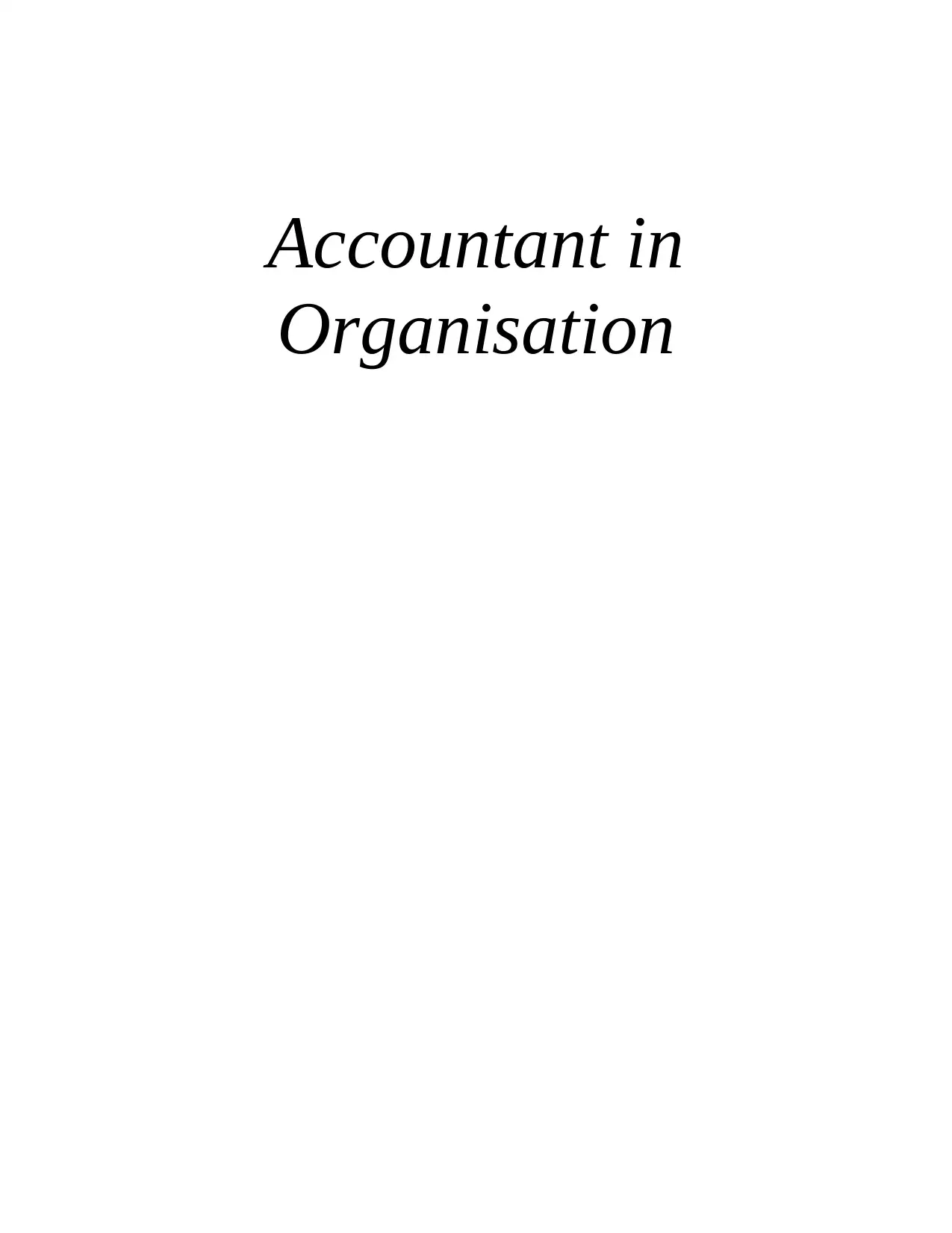
Accountant in
Organisation
Organisation
Paraphrase This Document
Need a fresh take? Get an instant paraphrase of this document with our AI Paraphraser
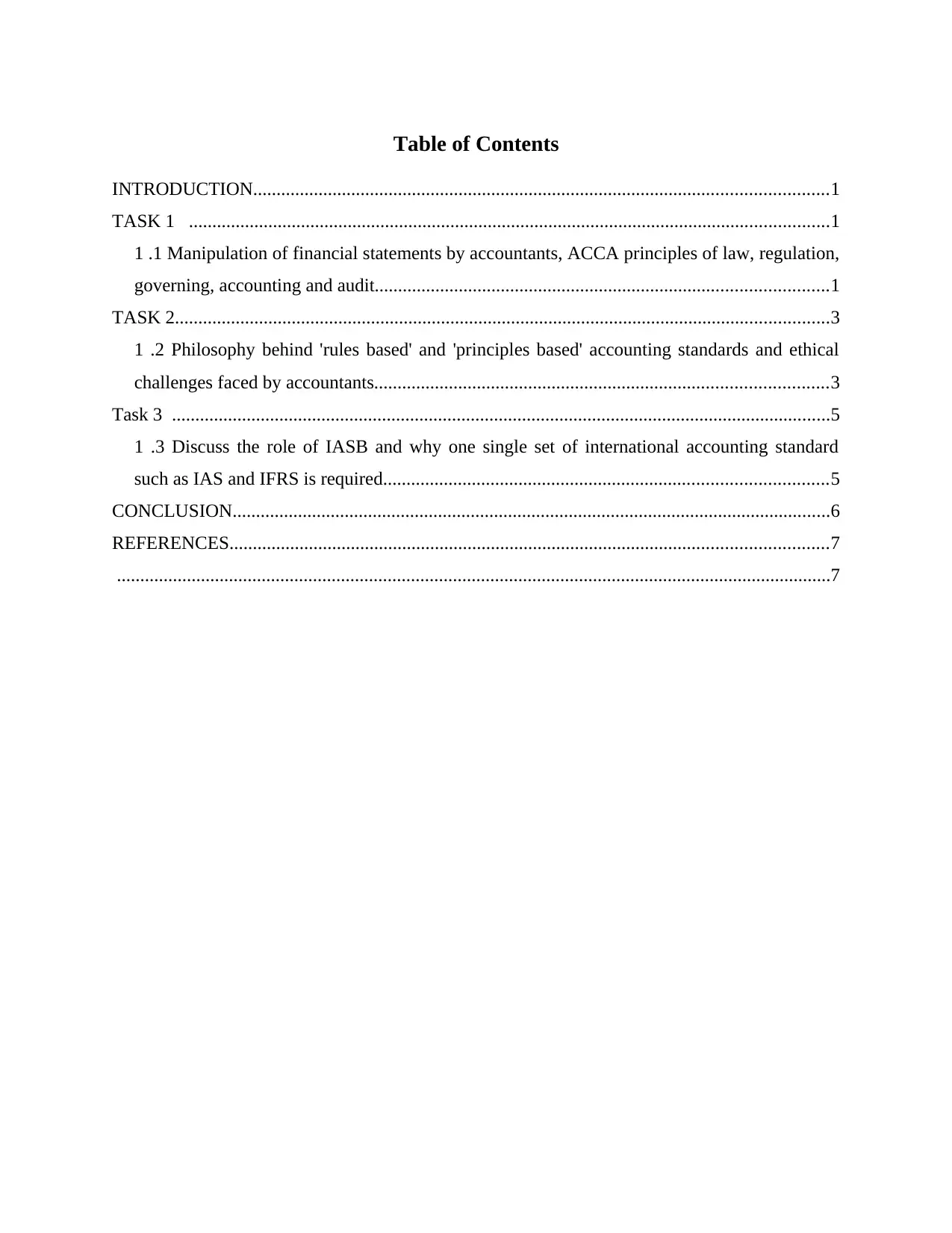
Table of Contents
INTRODUCTION...........................................................................................................................1
TASK 1 .........................................................................................................................................1
1 .1 Manipulation of financial statements by accountants, ACCA principles of law, regulation,
governing, accounting and audit.................................................................................................1
TASK 2............................................................................................................................................3
1 .2 Philosophy behind 'rules based' and 'principles based' accounting standards and ethical
challenges faced by accountants.................................................................................................3
Task 3 .............................................................................................................................................5
1 .3 Discuss the role of IASB and why one single set of international accounting standard
such as IAS and IFRS is required...............................................................................................5
CONCLUSION................................................................................................................................6
REFERENCES................................................................................................................................7
.........................................................................................................................................................7
INTRODUCTION...........................................................................................................................1
TASK 1 .........................................................................................................................................1
1 .1 Manipulation of financial statements by accountants, ACCA principles of law, regulation,
governing, accounting and audit.................................................................................................1
TASK 2............................................................................................................................................3
1 .2 Philosophy behind 'rules based' and 'principles based' accounting standards and ethical
challenges faced by accountants.................................................................................................3
Task 3 .............................................................................................................................................5
1 .3 Discuss the role of IASB and why one single set of international accounting standard
such as IAS and IFRS is required...............................................................................................5
CONCLUSION................................................................................................................................6
REFERENCES................................................................................................................................7
.........................................................................................................................................................7
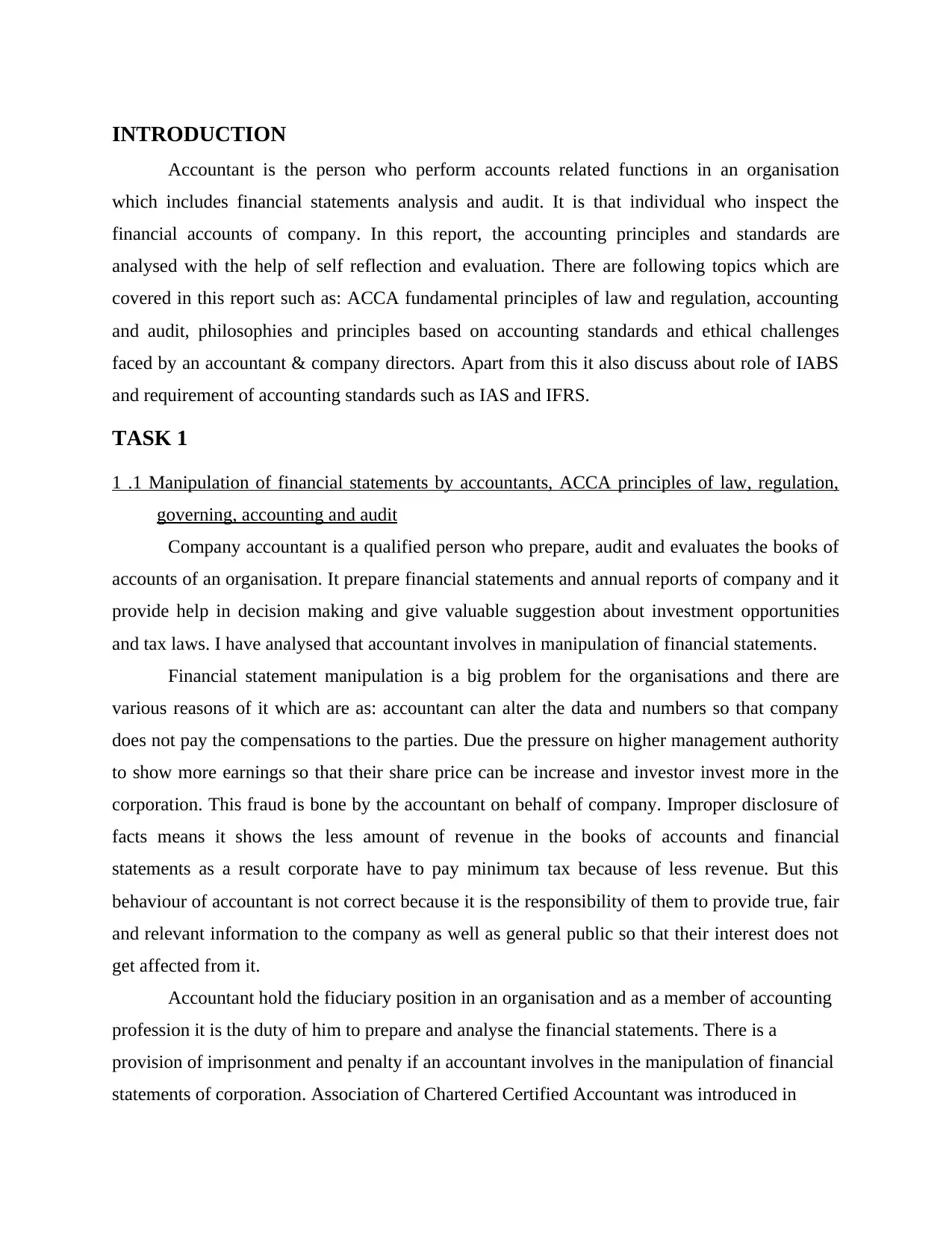
INTRODUCTION
Accountant is the person who perform accounts related functions in an organisation
which includes financial statements analysis and audit. It is that individual who inspect the
financial accounts of company. In this report, the accounting principles and standards are
analysed with the help of self reflection and evaluation. There are following topics which are
covered in this report such as: ACCA fundamental principles of law and regulation, accounting
and audit, philosophies and principles based on accounting standards and ethical challenges
faced by an accountant & company directors. Apart from this it also discuss about role of IABS
and requirement of accounting standards such as IAS and IFRS.
TASK 1
1 .1 Manipulation of financial statements by accountants, ACCA principles of law, regulation,
governing, accounting and audit
Company accountant is a qualified person who prepare, audit and evaluates the books of
accounts of an organisation. It prepare financial statements and annual reports of company and it
provide help in decision making and give valuable suggestion about investment opportunities
and tax laws. I have analysed that accountant involves in manipulation of financial statements.
Financial statement manipulation is a big problem for the organisations and there are
various reasons of it which are as: accountant can alter the data and numbers so that company
does not pay the compensations to the parties. Due the pressure on higher management authority
to show more earnings so that their share price can be increase and investor invest more in the
corporation. This fraud is bone by the accountant on behalf of company. Improper disclosure of
facts means it shows the less amount of revenue in the books of accounts and financial
statements as a result corporate have to pay minimum tax because of less revenue. But this
behaviour of accountant is not correct because it is the responsibility of them to provide true, fair
and relevant information to the company as well as general public so that their interest does not
get affected from it.
Accountant hold the fiduciary position in an organisation and as a member of accounting
profession it is the duty of him to prepare and analyse the financial statements. There is a
provision of imprisonment and penalty if an accountant involves in the manipulation of financial
statements of corporation. Association of Chartered Certified Accountant was introduced in
Accountant is the person who perform accounts related functions in an organisation
which includes financial statements analysis and audit. It is that individual who inspect the
financial accounts of company. In this report, the accounting principles and standards are
analysed with the help of self reflection and evaluation. There are following topics which are
covered in this report such as: ACCA fundamental principles of law and regulation, accounting
and audit, philosophies and principles based on accounting standards and ethical challenges
faced by an accountant & company directors. Apart from this it also discuss about role of IABS
and requirement of accounting standards such as IAS and IFRS.
TASK 1
1 .1 Manipulation of financial statements by accountants, ACCA principles of law, regulation,
governing, accounting and audit
Company accountant is a qualified person who prepare, audit and evaluates the books of
accounts of an organisation. It prepare financial statements and annual reports of company and it
provide help in decision making and give valuable suggestion about investment opportunities
and tax laws. I have analysed that accountant involves in manipulation of financial statements.
Financial statement manipulation is a big problem for the organisations and there are
various reasons of it which are as: accountant can alter the data and numbers so that company
does not pay the compensations to the parties. Due the pressure on higher management authority
to show more earnings so that their share price can be increase and investor invest more in the
corporation. This fraud is bone by the accountant on behalf of company. Improper disclosure of
facts means it shows the less amount of revenue in the books of accounts and financial
statements as a result corporate have to pay minimum tax because of less revenue. But this
behaviour of accountant is not correct because it is the responsibility of them to provide true, fair
and relevant information to the company as well as general public so that their interest does not
get affected from it.
Accountant hold the fiduciary position in an organisation and as a member of accounting
profession it is the duty of him to prepare and analyse the financial statements. There is a
provision of imprisonment and penalty if an accountant involves in the manipulation of financial
statements of corporation. Association of Chartered Certified Accountant was introduced in
⊘ This is a preview!⊘
Do you want full access?
Subscribe today to unlock all pages.

Trusted by 1+ million students worldwide
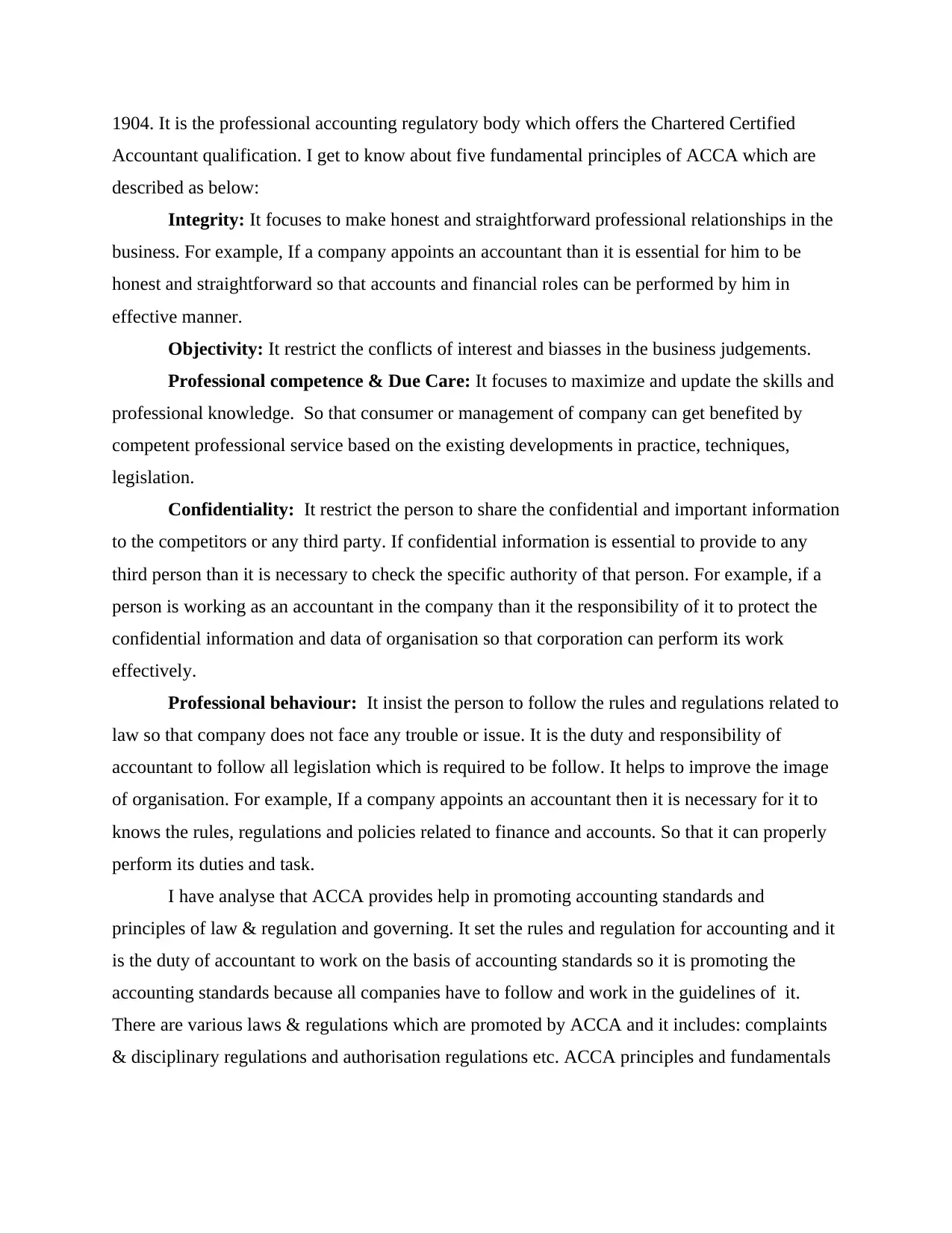
1904. It is the professional accounting regulatory body which offers the Chartered Certified
Accountant qualification. I get to know about five fundamental principles of ACCA which are
described as below:
Integrity: It focuses to make honest and straightforward professional relationships in the
business. For example, If a company appoints an accountant than it is essential for him to be
honest and straightforward so that accounts and financial roles can be performed by him in
effective manner.
Objectivity: It restrict the conflicts of interest and biasses in the business judgements.
Professional competence & Due Care: It focuses to maximize and update the skills and
professional knowledge. So that consumer or management of company can get benefited by
competent professional service based on the existing developments in practice, techniques,
legislation.
Confidentiality: It restrict the person to share the confidential and important information
to the competitors or any third party. If confidential information is essential to provide to any
third person than it is necessary to check the specific authority of that person. For example, if a
person is working as an accountant in the company than it the responsibility of it to protect the
confidential information and data of organisation so that corporation can perform its work
effectively.
Professional behaviour: It insist the person to follow the rules and regulations related to
law so that company does not face any trouble or issue. It is the duty and responsibility of
accountant to follow all legislation which is required to be follow. It helps to improve the image
of organisation. For example, If a company appoints an accountant then it is necessary for it to
knows the rules, regulations and policies related to finance and accounts. So that it can properly
perform its duties and task.
I have analyse that ACCA provides help in promoting accounting standards and
principles of law & regulation and governing. It set the rules and regulation for accounting and it
is the duty of accountant to work on the basis of accounting standards so it is promoting the
accounting standards because all companies have to follow and work in the guidelines of it.
There are various laws & regulations which are promoted by ACCA and it includes: complaints
& disciplinary regulations and authorisation regulations etc. ACCA principles and fundamentals
Accountant qualification. I get to know about five fundamental principles of ACCA which are
described as below:
Integrity: It focuses to make honest and straightforward professional relationships in the
business. For example, If a company appoints an accountant than it is essential for him to be
honest and straightforward so that accounts and financial roles can be performed by him in
effective manner.
Objectivity: It restrict the conflicts of interest and biasses in the business judgements.
Professional competence & Due Care: It focuses to maximize and update the skills and
professional knowledge. So that consumer or management of company can get benefited by
competent professional service based on the existing developments in practice, techniques,
legislation.
Confidentiality: It restrict the person to share the confidential and important information
to the competitors or any third party. If confidential information is essential to provide to any
third person than it is necessary to check the specific authority of that person. For example, if a
person is working as an accountant in the company than it the responsibility of it to protect the
confidential information and data of organisation so that corporation can perform its work
effectively.
Professional behaviour: It insist the person to follow the rules and regulations related to
law so that company does not face any trouble or issue. It is the duty and responsibility of
accountant to follow all legislation which is required to be follow. It helps to improve the image
of organisation. For example, If a company appoints an accountant then it is necessary for it to
knows the rules, regulations and policies related to finance and accounts. So that it can properly
perform its duties and task.
I have analyse that ACCA provides help in promoting accounting standards and
principles of law & regulation and governing. It set the rules and regulation for accounting and it
is the duty of accountant to work on the basis of accounting standards so it is promoting the
accounting standards because all companies have to follow and work in the guidelines of it.
There are various laws & regulations which are promoted by ACCA and it includes: complaints
& disciplinary regulations and authorisation regulations etc. ACCA principles and fundamentals
Paraphrase This Document
Need a fresh take? Get an instant paraphrase of this document with our AI Paraphraser
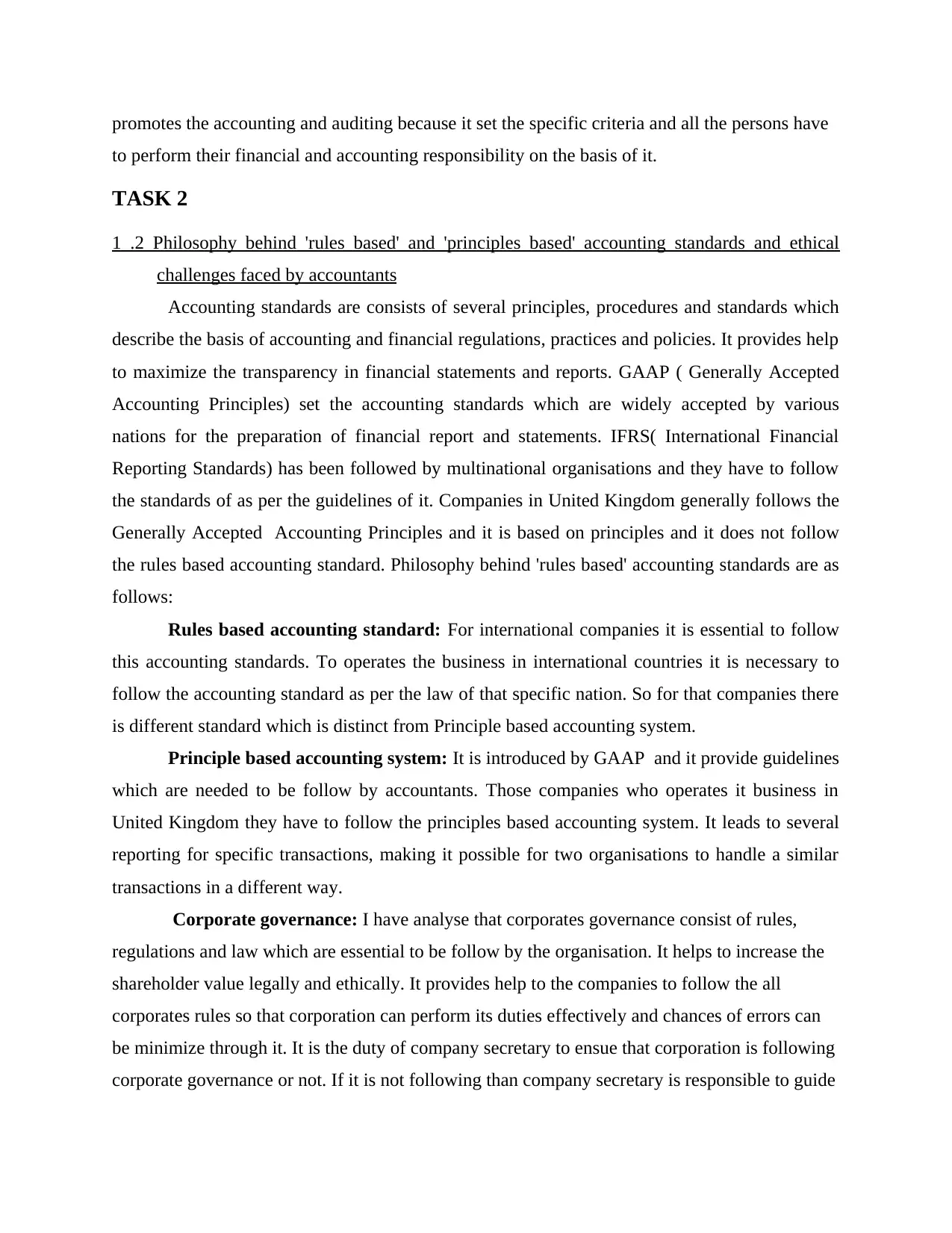
promotes the accounting and auditing because it set the specific criteria and all the persons have
to perform their financial and accounting responsibility on the basis of it.
TASK 2
1 .2 Philosophy behind 'rules based' and 'principles based' accounting standards and ethical
challenges faced by accountants
Accounting standards are consists of several principles, procedures and standards which
describe the basis of accounting and financial regulations, practices and policies. It provides help
to maximize the transparency in financial statements and reports. GAAP ( Generally Accepted
Accounting Principles) set the accounting standards which are widely accepted by various
nations for the preparation of financial report and statements. IFRS( International Financial
Reporting Standards) has been followed by multinational organisations and they have to follow
the standards of as per the guidelines of it. Companies in United Kingdom generally follows the
Generally Accepted Accounting Principles and it is based on principles and it does not follow
the rules based accounting standard. Philosophy behind 'rules based' accounting standards are as
follows:
Rules based accounting standard: For international companies it is essential to follow
this accounting standards. To operates the business in international countries it is necessary to
follow the accounting standard as per the law of that specific nation. So for that companies there
is different standard which is distinct from Principle based accounting system.
Principle based accounting system: It is introduced by GAAP and it provide guidelines
which are needed to be follow by accountants. Those companies who operates it business in
United Kingdom they have to follow the principles based accounting system. It leads to several
reporting for specific transactions, making it possible for two organisations to handle a similar
transactions in a different way.
Corporate governance: I have analyse that corporates governance consist of rules,
regulations and law which are essential to be follow by the organisation. It helps to increase the
shareholder value legally and ethically. It provides help to the companies to follow the all
corporates rules so that corporation can perform its duties effectively and chances of errors can
be minimize through it. It is the duty of company secretary to ensue that corporation is following
corporate governance or not. If it is not following than company secretary is responsible to guide
to perform their financial and accounting responsibility on the basis of it.
TASK 2
1 .2 Philosophy behind 'rules based' and 'principles based' accounting standards and ethical
challenges faced by accountants
Accounting standards are consists of several principles, procedures and standards which
describe the basis of accounting and financial regulations, practices and policies. It provides help
to maximize the transparency in financial statements and reports. GAAP ( Generally Accepted
Accounting Principles) set the accounting standards which are widely accepted by various
nations for the preparation of financial report and statements. IFRS( International Financial
Reporting Standards) has been followed by multinational organisations and they have to follow
the standards of as per the guidelines of it. Companies in United Kingdom generally follows the
Generally Accepted Accounting Principles and it is based on principles and it does not follow
the rules based accounting standard. Philosophy behind 'rules based' accounting standards are as
follows:
Rules based accounting standard: For international companies it is essential to follow
this accounting standards. To operates the business in international countries it is necessary to
follow the accounting standard as per the law of that specific nation. So for that companies there
is different standard which is distinct from Principle based accounting system.
Principle based accounting system: It is introduced by GAAP and it provide guidelines
which are needed to be follow by accountants. Those companies who operates it business in
United Kingdom they have to follow the principles based accounting system. It leads to several
reporting for specific transactions, making it possible for two organisations to handle a similar
transactions in a different way.
Corporate governance: I have analyse that corporates governance consist of rules,
regulations and law which are essential to be follow by the organisation. It helps to increase the
shareholder value legally and ethically. It provides help to the companies to follow the all
corporates rules so that corporation can perform its duties effectively and chances of errors can
be minimize through it. It is the duty of company secretary to ensue that corporation is following
corporate governance or not. If it is not following than company secretary is responsible to guide
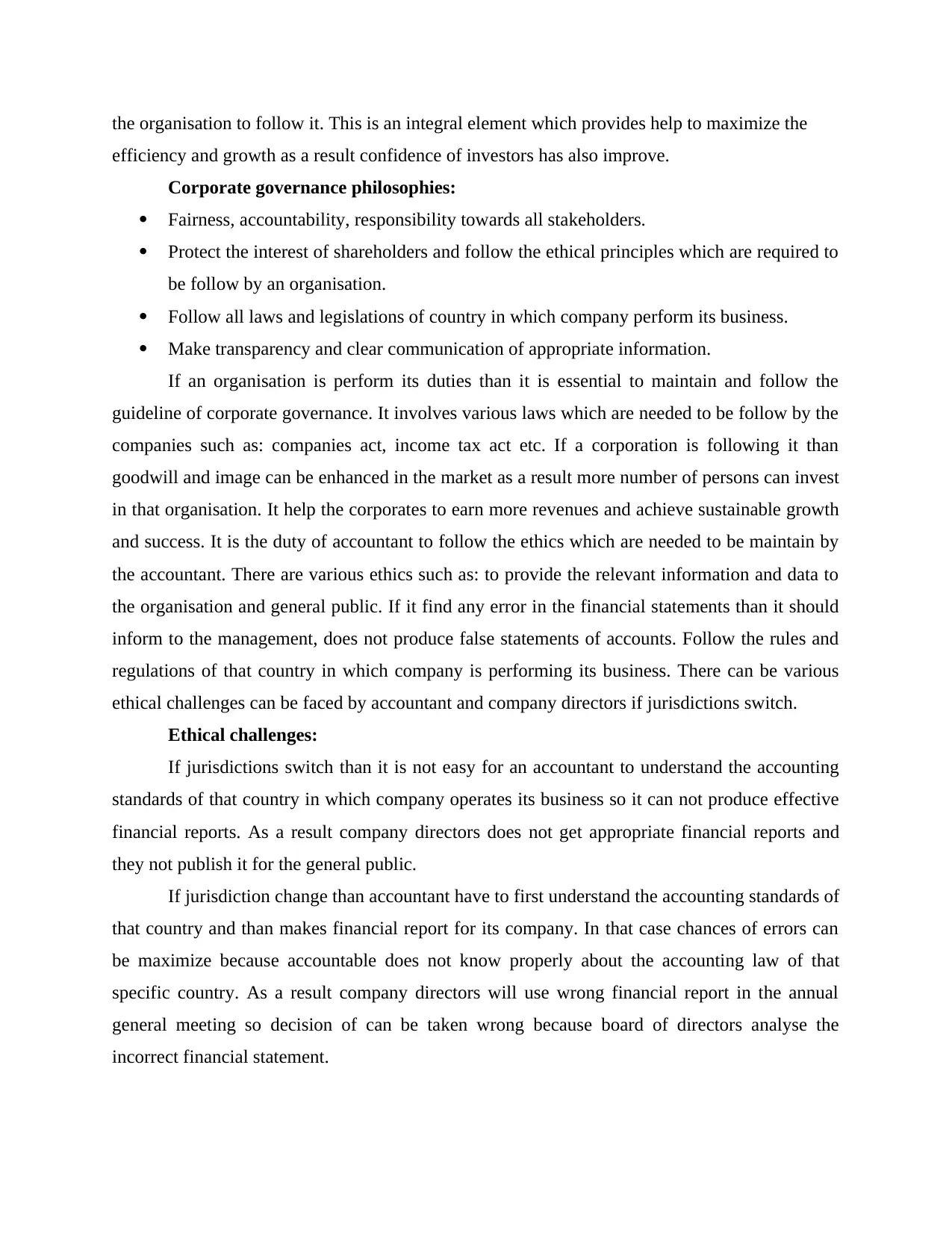
the organisation to follow it. This is an integral element which provides help to maximize the
efficiency and growth as a result confidence of investors has also improve.
Corporate governance philosophies:
Fairness, accountability, responsibility towards all stakeholders.
Protect the interest of shareholders and follow the ethical principles which are required to
be follow by an organisation.
Follow all laws and legislations of country in which company perform its business.
Make transparency and clear communication of appropriate information.
If an organisation is perform its duties than it is essential to maintain and follow the
guideline of corporate governance. It involves various laws which are needed to be follow by the
companies such as: companies act, income tax act etc. If a corporation is following it than
goodwill and image can be enhanced in the market as a result more number of persons can invest
in that organisation. It help the corporates to earn more revenues and achieve sustainable growth
and success. It is the duty of accountant to follow the ethics which are needed to be maintain by
the accountant. There are various ethics such as: to provide the relevant information and data to
the organisation and general public. If it find any error in the financial statements than it should
inform to the management, does not produce false statements of accounts. Follow the rules and
regulations of that country in which company is performing its business. There can be various
ethical challenges can be faced by accountant and company directors if jurisdictions switch.
Ethical challenges:
If jurisdictions switch than it is not easy for an accountant to understand the accounting
standards of that country in which company operates its business so it can not produce effective
financial reports. As a result company directors does not get appropriate financial reports and
they not publish it for the general public.
If jurisdiction change than accountant have to first understand the accounting standards of
that country and than makes financial report for its company. In that case chances of errors can
be maximize because accountable does not know properly about the accounting law of that
specific country. As a result company directors will use wrong financial report in the annual
general meeting so decision of can be taken wrong because board of directors analyse the
incorrect financial statement.
efficiency and growth as a result confidence of investors has also improve.
Corporate governance philosophies:
Fairness, accountability, responsibility towards all stakeholders.
Protect the interest of shareholders and follow the ethical principles which are required to
be follow by an organisation.
Follow all laws and legislations of country in which company perform its business.
Make transparency and clear communication of appropriate information.
If an organisation is perform its duties than it is essential to maintain and follow the
guideline of corporate governance. It involves various laws which are needed to be follow by the
companies such as: companies act, income tax act etc. If a corporation is following it than
goodwill and image can be enhanced in the market as a result more number of persons can invest
in that organisation. It help the corporates to earn more revenues and achieve sustainable growth
and success. It is the duty of accountant to follow the ethics which are needed to be maintain by
the accountant. There are various ethics such as: to provide the relevant information and data to
the organisation and general public. If it find any error in the financial statements than it should
inform to the management, does not produce false statements of accounts. Follow the rules and
regulations of that country in which company is performing its business. There can be various
ethical challenges can be faced by accountant and company directors if jurisdictions switch.
Ethical challenges:
If jurisdictions switch than it is not easy for an accountant to understand the accounting
standards of that country in which company operates its business so it can not produce effective
financial reports. As a result company directors does not get appropriate financial reports and
they not publish it for the general public.
If jurisdiction change than accountant have to first understand the accounting standards of
that country and than makes financial report for its company. In that case chances of errors can
be maximize because accountable does not know properly about the accounting law of that
specific country. As a result company directors will use wrong financial report in the annual
general meeting so decision of can be taken wrong because board of directors analyse the
incorrect financial statement.
⊘ This is a preview!⊘
Do you want full access?
Subscribe today to unlock all pages.

Trusted by 1+ million students worldwide
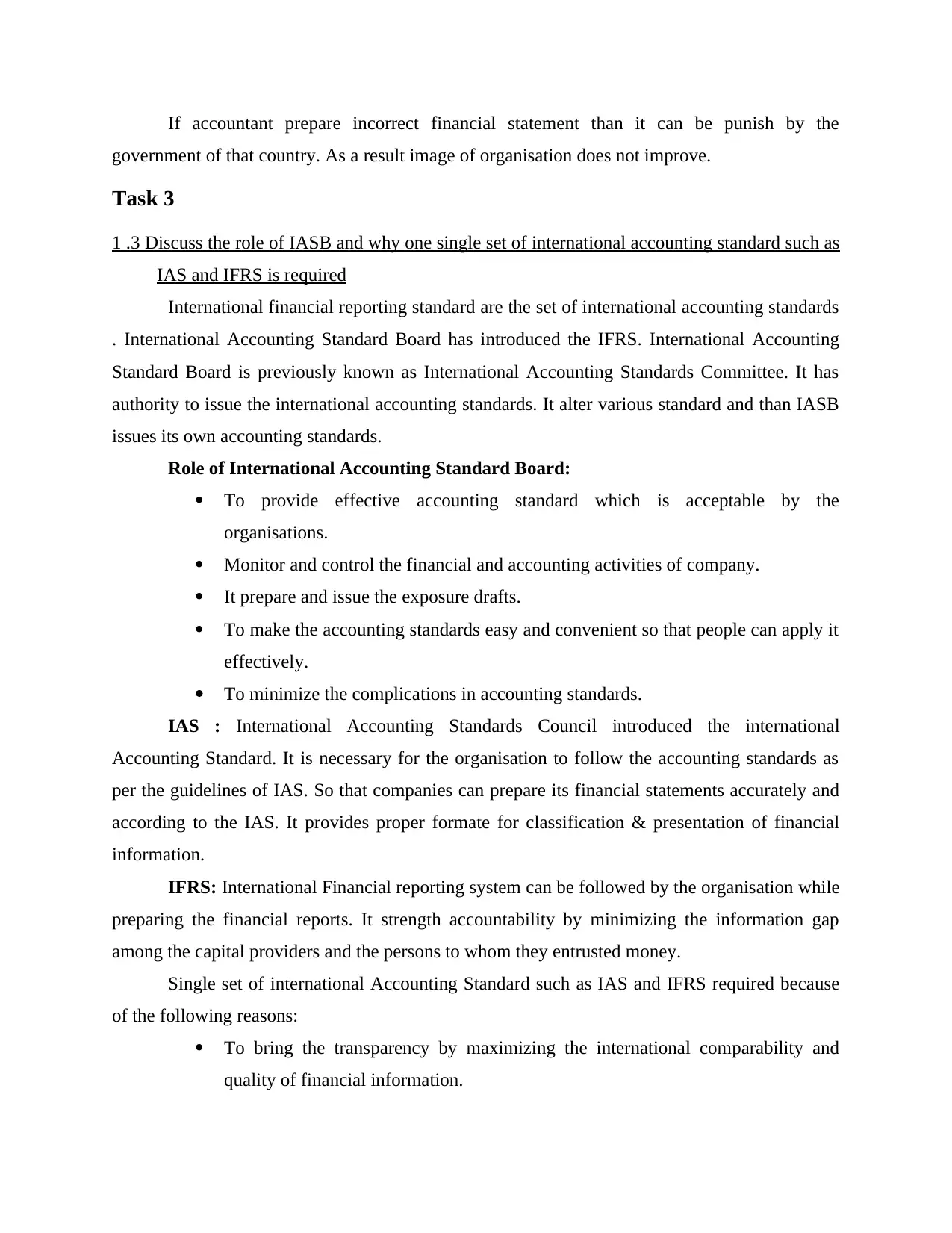
If accountant prepare incorrect financial statement than it can be punish by the
government of that country. As a result image of organisation does not improve.
Task 3
1 .3 Discuss the role of IASB and why one single set of international accounting standard such as
IAS and IFRS is required
International financial reporting standard are the set of international accounting standards
. International Accounting Standard Board has introduced the IFRS. International Accounting
Standard Board is previously known as International Accounting Standards Committee. It has
authority to issue the international accounting standards. It alter various standard and than IASB
issues its own accounting standards.
Role of International Accounting Standard Board:
To provide effective accounting standard which is acceptable by the
organisations.
Monitor and control the financial and accounting activities of company.
It prepare and issue the exposure drafts.
To make the accounting standards easy and convenient so that people can apply it
effectively.
To minimize the complications in accounting standards.
IAS : International Accounting Standards Council introduced the international
Accounting Standard. It is necessary for the organisation to follow the accounting standards as
per the guidelines of IAS. So that companies can prepare its financial statements accurately and
according to the IAS. It provides proper formate for classification & presentation of financial
information.
IFRS: International Financial reporting system can be followed by the organisation while
preparing the financial reports. It strength accountability by minimizing the information gap
among the capital providers and the persons to whom they entrusted money.
Single set of international Accounting Standard such as IAS and IFRS required because
of the following reasons:
To bring the transparency by maximizing the international comparability and
quality of financial information.
government of that country. As a result image of organisation does not improve.
Task 3
1 .3 Discuss the role of IASB and why one single set of international accounting standard such as
IAS and IFRS is required
International financial reporting standard are the set of international accounting standards
. International Accounting Standard Board has introduced the IFRS. International Accounting
Standard Board is previously known as International Accounting Standards Committee. It has
authority to issue the international accounting standards. It alter various standard and than IASB
issues its own accounting standards.
Role of International Accounting Standard Board:
To provide effective accounting standard which is acceptable by the
organisations.
Monitor and control the financial and accounting activities of company.
It prepare and issue the exposure drafts.
To make the accounting standards easy and convenient so that people can apply it
effectively.
To minimize the complications in accounting standards.
IAS : International Accounting Standards Council introduced the international
Accounting Standard. It is necessary for the organisation to follow the accounting standards as
per the guidelines of IAS. So that companies can prepare its financial statements accurately and
according to the IAS. It provides proper formate for classification & presentation of financial
information.
IFRS: International Financial reporting system can be followed by the organisation while
preparing the financial reports. It strength accountability by minimizing the information gap
among the capital providers and the persons to whom they entrusted money.
Single set of international Accounting Standard such as IAS and IFRS required because
of the following reasons:
To bring the transparency by maximizing the international comparability and
quality of financial information.
Paraphrase This Document
Need a fresh take? Get an instant paraphrase of this document with our AI Paraphraser
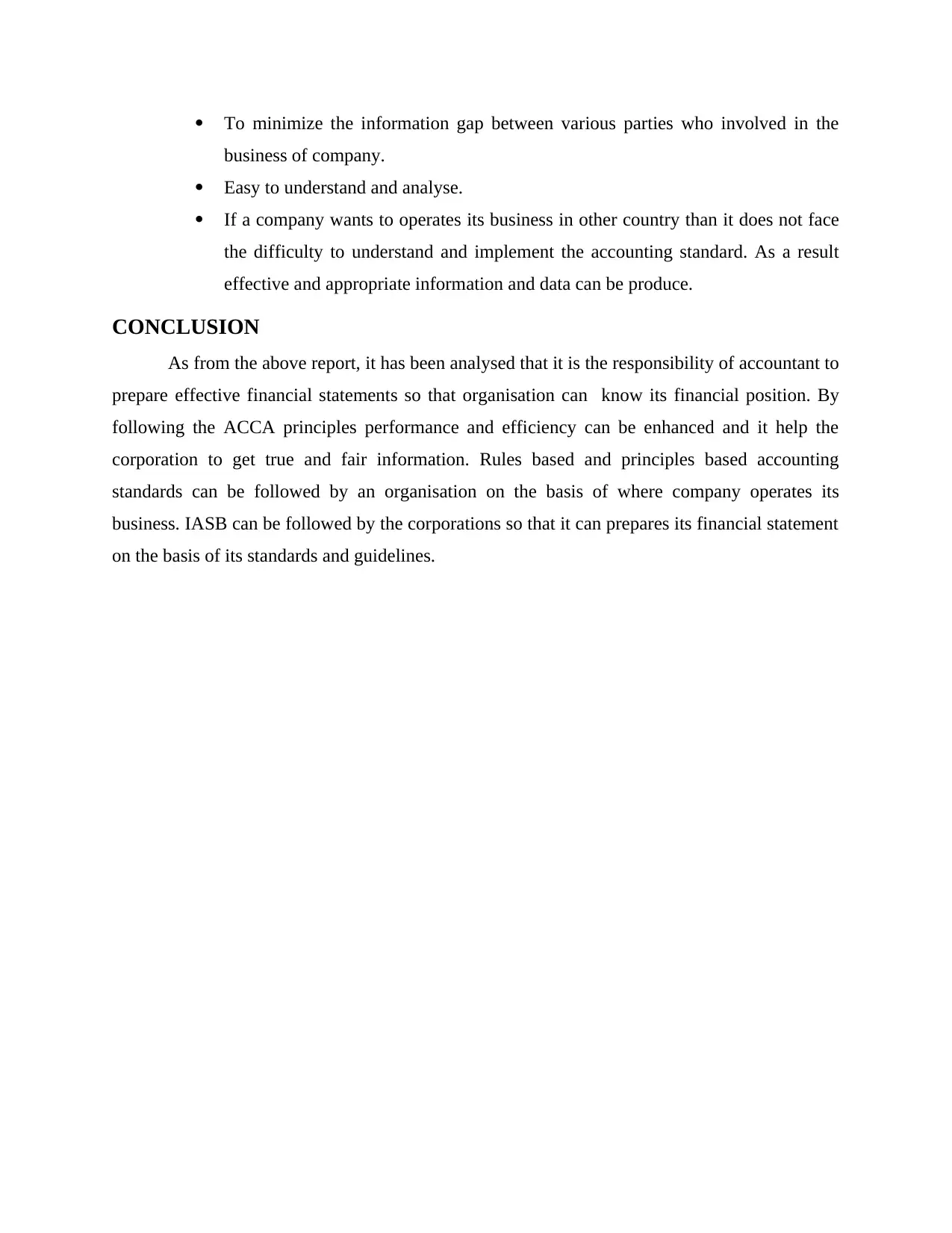
To minimize the information gap between various parties who involved in the
business of company.
Easy to understand and analyse.
If a company wants to operates its business in other country than it does not face
the difficulty to understand and implement the accounting standard. As a result
effective and appropriate information and data can be produce.
CONCLUSION
As from the above report, it has been analysed that it is the responsibility of accountant to
prepare effective financial statements so that organisation can know its financial position. By
following the ACCA principles performance and efficiency can be enhanced and it help the
corporation to get true and fair information. Rules based and principles based accounting
standards can be followed by an organisation on the basis of where company operates its
business. IASB can be followed by the corporations so that it can prepares its financial statement
on the basis of its standards and guidelines.
business of company.
Easy to understand and analyse.
If a company wants to operates its business in other country than it does not face
the difficulty to understand and implement the accounting standard. As a result
effective and appropriate information and data can be produce.
CONCLUSION
As from the above report, it has been analysed that it is the responsibility of accountant to
prepare effective financial statements so that organisation can know its financial position. By
following the ACCA principles performance and efficiency can be enhanced and it help the
corporation to get true and fair information. Rules based and principles based accounting
standards can be followed by an organisation on the basis of where company operates its
business. IASB can be followed by the corporations so that it can prepares its financial statement
on the basis of its standards and guidelines.
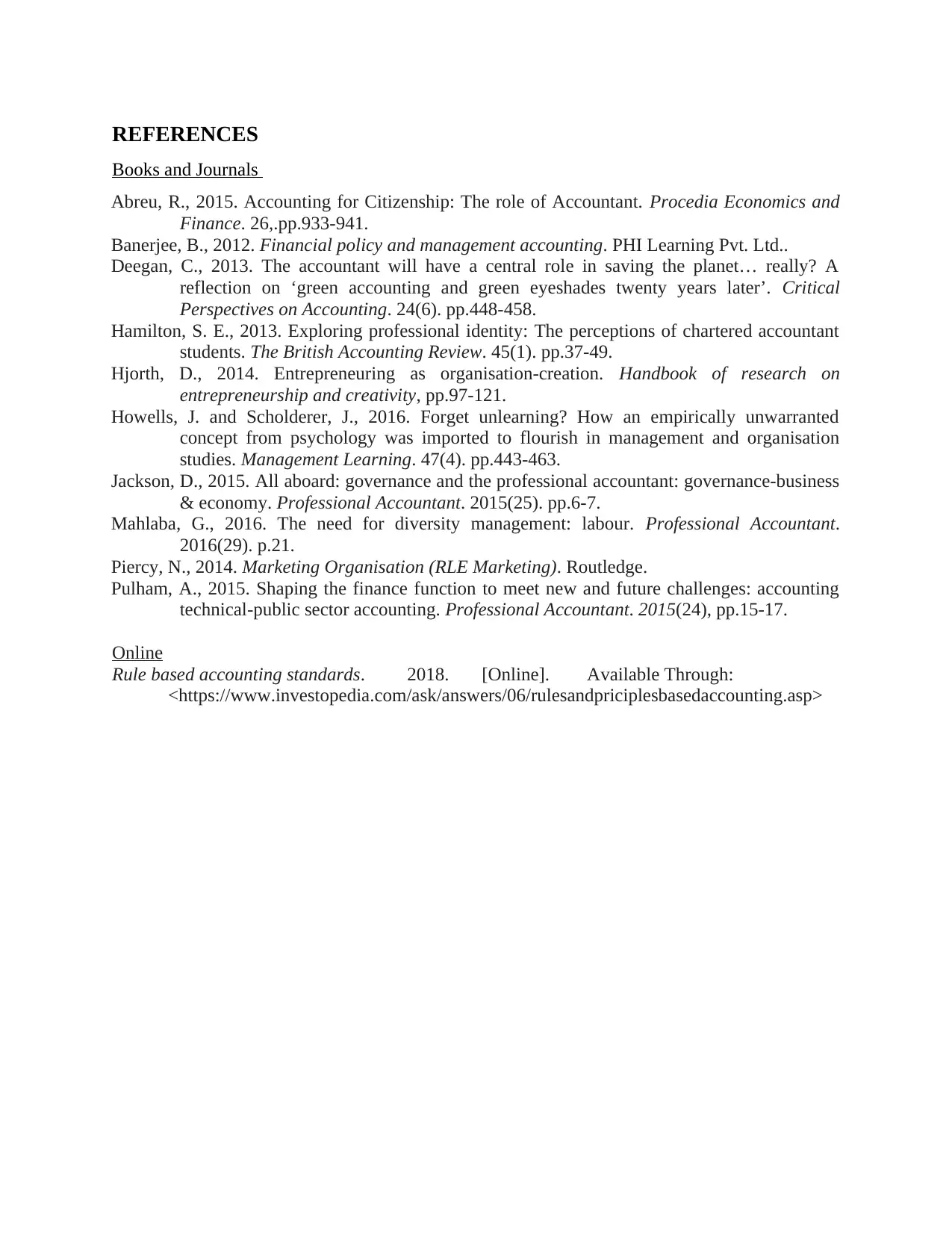
REFERENCES
Books and Journals
Abreu, R., 2015. Accounting for Citizenship: The role of Accountant. Procedia Economics and
Finance. 26,.pp.933-941.
Banerjee, B., 2012. Financial policy and management accounting. PHI Learning Pvt. Ltd..
Deegan, C., 2013. The accountant will have a central role in saving the planet… really? A
reflection on ‘green accounting and green eyeshades twenty years later’. Critical
Perspectives on Accounting. 24(6). pp.448-458.
Hamilton, S. E., 2013. Exploring professional identity: The perceptions of chartered accountant
students. The British Accounting Review. 45(1). pp.37-49.
Hjorth, D., 2014. Entrepreneuring as organisation-creation. Handbook of research on
entrepreneurship and creativity, pp.97-121.
Howells, J. and Scholderer, J., 2016. Forget unlearning? How an empirically unwarranted
concept from psychology was imported to flourish in management and organisation
studies. Management Learning. 47(4). pp.443-463.
Jackson, D., 2015. All aboard: governance and the professional accountant: governance-business
& economy. Professional Accountant. 2015(25). pp.6-7.
Mahlaba, G., 2016. The need for diversity management: labour. Professional Accountant.
2016(29). p.21.
Piercy, N., 2014. Marketing Organisation (RLE Marketing). Routledge.
Pulham, A., 2015. Shaping the finance function to meet new and future challenges: accounting
technical-public sector accounting. Professional Accountant. 2015(24), pp.15-17.
Online
Rule based accounting standards. 2018. [Online]. Available Through:
<https://www.investopedia.com/ask/answers/06/rulesandpriciplesbasedaccounting.asp>
Books and Journals
Abreu, R., 2015. Accounting for Citizenship: The role of Accountant. Procedia Economics and
Finance. 26,.pp.933-941.
Banerjee, B., 2012. Financial policy and management accounting. PHI Learning Pvt. Ltd..
Deegan, C., 2013. The accountant will have a central role in saving the planet… really? A
reflection on ‘green accounting and green eyeshades twenty years later’. Critical
Perspectives on Accounting. 24(6). pp.448-458.
Hamilton, S. E., 2013. Exploring professional identity: The perceptions of chartered accountant
students. The British Accounting Review. 45(1). pp.37-49.
Hjorth, D., 2014. Entrepreneuring as organisation-creation. Handbook of research on
entrepreneurship and creativity, pp.97-121.
Howells, J. and Scholderer, J., 2016. Forget unlearning? How an empirically unwarranted
concept from psychology was imported to flourish in management and organisation
studies. Management Learning. 47(4). pp.443-463.
Jackson, D., 2015. All aboard: governance and the professional accountant: governance-business
& economy. Professional Accountant. 2015(25). pp.6-7.
Mahlaba, G., 2016. The need for diversity management: labour. Professional Accountant.
2016(29). p.21.
Piercy, N., 2014. Marketing Organisation (RLE Marketing). Routledge.
Pulham, A., 2015. Shaping the finance function to meet new and future challenges: accounting
technical-public sector accounting. Professional Accountant. 2015(24), pp.15-17.
Online
Rule based accounting standards. 2018. [Online]. Available Through:
<https://www.investopedia.com/ask/answers/06/rulesandpriciplesbasedaccounting.asp>
⊘ This is a preview!⊘
Do you want full access?
Subscribe today to unlock all pages.

Trusted by 1+ million students worldwide
1 out of 9
Related Documents
Your All-in-One AI-Powered Toolkit for Academic Success.
+13062052269
info@desklib.com
Available 24*7 on WhatsApp / Email
![[object Object]](/_next/static/media/star-bottom.7253800d.svg)
Unlock your academic potential
Copyright © 2020–2025 A2Z Services. All Rights Reserved. Developed and managed by ZUCOL.





